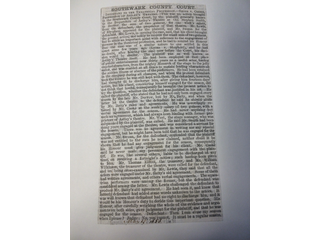Transcription
SOUTHWARK COUNTRY COURT.
IMPORTANT TO THE THEATRICAL PROFESSION.—SMITH V. COOKE,
PROPRIETOR OF ASTLEY’S THEATRE.—This was an action brought in the Southwark County Court, by the plaintiff, generally known to the frequenters of Astley’s Theatre as Old Stephen Smith, to recover the sum of two guineas, for one work’s salary, from the defendant, the proprietor of that theatre. Mr. Lewis, of Ely-place, appeared for the plaintiff, and Mr. Swann for the defendant. Mr. Lewis, in opening the case, said, that his client brought the present action, not solely to recover the small sum of two guineas, but to settle an important point with reference to the engagement of persons in the theatrical profession, and he had to remind his Honour that the case was of a similar nature to one settled in this court some few years ago (Lyons V. Shepherd), and he had no doubt, after hearing the case now before the Court, his decision would be similar. The plaintiff was as well known as Astley’s Theatre itself. He had been employed at that place of public entertainment near thirty years as a useful actor, having enacted characters, from the mighty Monarch of the stage to the jolly sailor, and was enabled at all times to sustain leading characters on the sudden illness or absence of the performers. He had been retained in the company during all changes, and when the present defendant took the theatre he was still kept with them. The defendant, however, had thought it fit to discharge him, after giving him fourteen days notice, but this client, considering himself engaged for the season, did not think that lawful, consequently he brought the present action to try the question, whether the defendant was justified in his act. He called the plaintiff, who stated that he had not only been engaged every season by the late Mr. Ducrow, but by Mr. Batty, and when the latter let the theatre to the defendant he said he should abide by Mr. Batty’s rules and agreements. He was accordingly retained by Mr. Cooke at the weekly salary of two guineas, with a verbal agreement for the season. He had never anything but such an agreement, which had always been binding with former proprietors of Astley’s theatre. Mr. West, the stage manager, who was subpoenaed by the plaintiff, was called. He said Mr. Smith had been many years engaged at the theatre, and was considered a servant for the season. There was no agreement in writing nor any special engagement, but he might have been told that he was engaged for the season. Mr. Swann, for the defendant, contended that the plaintiff was not entitled to the sum he now claimed, neither could it be shown that he had any engagement for the season, consequently his Honour must give judgement for his client. Mr. Cooke said he never made any permanent engagement with the plaintiff. He was, like several others, liable to be discharged at any time, on receiving a fortnight’s notice; such having been given to him. Mr. Thomas Elliott, the treasurer, and Mr. Wilkinson, the treasurer of the theatre, were called for the defendant, and on being cross-examined by Mr. Lewis, they said that all the actors were engaged under Mr. Batty’s old agreement. Some of them had written agreements, and others verbal engagements. The equestrian performers were among the former, but the defendant was considered among the latter. Mr. Lewis challenged the defendant to produce Mr. Batty’s old agreement. He had seen it, and knew that latterly defendant had added some words unknown to the actors. It was well known that defendant had no right to discharge him, and it would be his Honour’s duty to decide this important question. His Honour, after carefully weighing the whole of the evidence and arguments on both sides, gave judgement for the plaintiff, and that he was engaged for the season. Defendant: Then Lean close my season when I please? Judge: No, you cannot. It must be a regular season.
